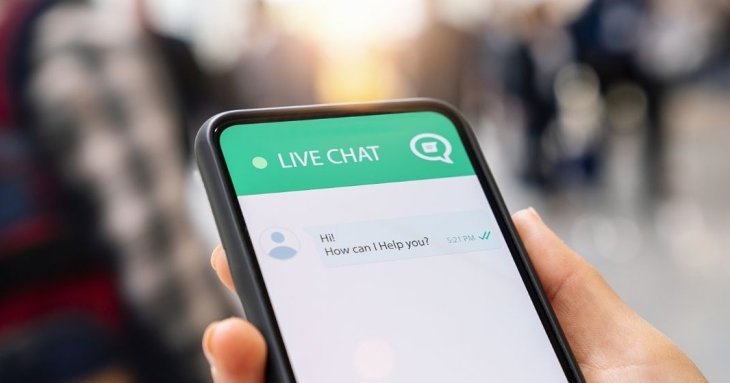In our ever-changing world, consumers expect a lot more from their customer...
Read more
 Published on 5th May 2024 by Gemma Harding
Published on 5th May 2024 by Gemma Harding
In today’s competitive market, exceptional customer service is crucial for success. Effective customer support resolves issues while enhancing customer loyalty, driving repeat business, and setting your brand apart.
Selecting the right support channel can significantly impact customer satisfaction and operational efficiency.
This article compares and contrasts the two primary support channels dominating the customer service industry: live chat and phone support.

Live chat support is a real-time communication tool that allows customers to interact directly with support agents on a website or app. Customers type their questions into a chat window and receive responses from support agents.
Many live chat systems incorporate chatbots to handle simple queries, escalating more complex issues to human agents. Agents can handle multiple chats simultaneously, improving efficiency.
Live chat is important in customer service for general inquiries and account management. Retail or e-commerce companies can also benefit from offering instant assistance regarding product details and purchase decisions, while software companies may use live chat to resolve user issues.

Phone support involves customers calling a number to speak directly with a customer service representative. Customers talk with agents in real-time, providing a more personal touch.
Agents typically work in call centres, handling incoming and outgoing calls. Automated systems, such as Interactive Voice Response (IVR), or an agent-operated switchboard can route calls to the appropriate people.
Phone support is effective for resolving complex technical issues that require detailed explanations. It is also crucial for addressing sensitive customer complaints where empathy and human touch are essential.
Companies may use phone support to handle sensitive account information, address complex inquiries, or schedule appointments.
Live chat offers instant responses, with customers receiving help within seconds to minutes.
In contrast, response times for phone support can vary, often involving waiting on hold, which can lead to longer wait times compared to live chat.
Quick response times are crucial for customer satisfaction.
Live chat’s instant responses often lead to higher satisfaction rates, especially for straightforward inquiries. Phone support, while potentially slower, allows for more in-depth and personalised interactions, which can be beneficial for complex issues.
Live chat offers convenience and speed, enhancing the overall customer experience.
Customers appreciate the ability to multitask while chatting and the quick resolution of simple queries. Phone support provides a more personal touch, which is crucial for building emotional connections and trust.
Surveys indicate that younger demographics tend to prefer live chat for its speed, while older customers may lean towards phone support for its familiarity and personal interaction.
Live chat is highly effective for resolving simple to moderately complex issues quickly. The ability to send links, screenshots, and other resources enhances problem-solving efficiency.
Phone support excels in resolving complex issues that require detailed explanations or emotional support, whereas live chat is ideal for FAQs, basic troubleshooting, and account management, while phone support is best for complex technical problems, sensitive issues, and detailed account inquiries.
Live chat can offer a degree of personalisation through pre-filled customer information and personalised greetings. However, it lacks the depth of personal interaction found in phone support. Phone support provides a higher level of personalisation through direct conversation, tone of voice, and emotional intelligence.
The human touch in customer service cannot be underestimated. It fosters trust and loyalty, making customers feel valued and understood. Read more about the importance of emotional intelligence in customer service.
Live chat integrates seamlessly with CRM systems, websites, and mobile apps. It can be easily scaled to handle increasing volumes of customer interactions. Phone support requires a more complex setup with dedicated lines, IVR systems, and trained personnel. Scaling phone support can be challenging and resource-intensive. Live chat offers greater scalability, making it a future-proof solution for growing businesses. However, maintaining a balance with phone support is essential to cater to all customer preferences.
Live chat is generally more cost-effective than phone support. It requires fewer resources and can handle multiple interactions simultaneously. Phone support tends to be more expensive due to higher infrastructure and staffing costs. Small to medium enterprises (SMEs) often find live chat more cost-effective, while large enterprises benefit from a combination of both channels to provide multichannel support, and increase customer accessibility.
Evaluate your business-specific needs, customer preferences, and operational capabilities to make an informed decision. Retail businesses can use live chat for immediate assistance and phone support for detailed inquiries. Technology companies might prefer live chat for troubleshooting and phone support for complex tech issues. Financial institutions often rely on phone support for handling sensitive information and live chat for general queries.
Choosing between live chat support and phone support depends on various factors, including customer demographics, issue complexity, and cost considerations. Both channels offer unique benefits and can significantly enhance customer experience when used appropriately.
By carefully evaluating your business needs and customer preferences, you can implement a support strategy that ensures exceptional customer service and drives long-term success. The future of customer support lies in a balanced approach that leverages the strengths of both live chat and phone support to meet customers’ evolving demands. If you need assistance in making the best choice for your business, contact us for expert advice. For personalised live chat solutions, consider exploring our live chat services.